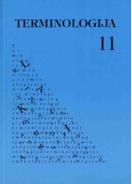Sudurtiniai elektrotechnikos terminijos būdvardžiai
Compound adjectives in the terminology of electrical engineering
Author(s): Robertas StunžinasSubject(s): Language and Literature Studies
Published by: Lietuvių Kalbos Institutas
Keywords: electrical engineering; terminology; complex terms; compound adjectives; hybrids; linguistic calques; categorical combinability
Summary/Abstract: This paper analyses in various aspects 345 complex terms, which include 138 different compound adjectives. In respect of word formation it is clear that nominal compound adjectives prevail and 85% of them are composite words of a numeral and a noun, an adjective and a noun or an adverb and a noun. Verbal composite words are rather rare. In respect of underlying words about two thirds of term elements are composite words made using means of the Lithuanian language, another third are hybrids. In this article, terms in which only the underlying words correspond with other language terms, are named featuring terms. A majority of the analysed words are possibly featuring Russian or German terms. 56.6% of Lithuanian composite words are identical to Russian terms and 42.4% - to German terms. Comparatively a small part of composite words in their underlying words are identical to English terms. Only two composite words could be treated as linguistic calques from the Russian. Linguistic calques here are those composite words, which are identical to other language words in their formation as well as their underlying words. Not all compound adjectives could be treated as formations. Composite words of a pronoun and a noun and of a numeral and a noun are common words, which were terminologized. In the terminology of electrical engineering compound adjectives most frequently signify characteristics of concrete things, less frequently - features of abstract things or actions. Categorical combinability is more characteristic to the hybrids of productive types.
Journal: Terminologija
- Issue Year: 2004
- Issue No: 11
- Page Range: 52-69
- Page Count: 18
- Language: Lithuanian

